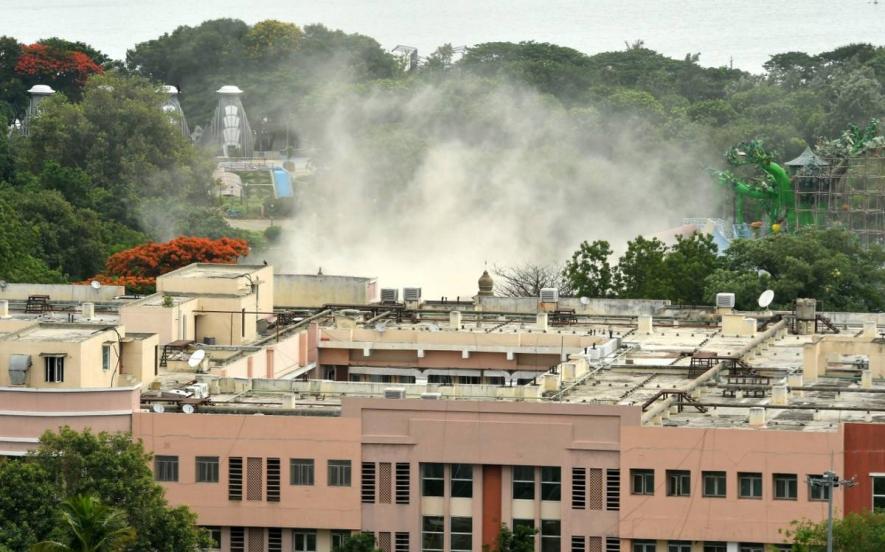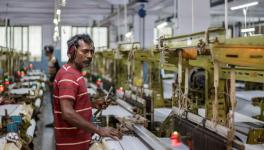Why Telangana Must Start Trend for Decentralised Capitals

Telangana old secretariat building being demolished. | Image Courtesy: The Hindu
The KCR government in Telangana has demolished the long-standing secretariat buildings and a new model for a secretariat has been put out in the public domain. Some sections are trying to find fault with the architectural design of the proposed secretariat, but in fact it looks good with its multi-cultural architecture style. In any case, a new secretariat is bound to come up, whatever its design.
The historic Assembly building cannot be demolished as its structures are heritage monuments. That whole area, being part of public gardens, is also bound to be kept up, as it can become a well-developed tourism spot. At this juncture, it is important to consider that a new Assembly building must be built in Warangal, which would make the small but classical city the legislative capital of the state.
A debate is going on in the country whether the state capitals and even the national capital should be set up at more than one place after Andhra Pradesh Chief Minister YS Jagan Mohan Reddy’s government proposed three locations for a capital—a legislative capital at Amaravati, an administrative one at Visakhapatnam and the judicial capital at Kurnool.
I am convinced after seeing millions of people go through the torturous course of Covid-19 in big metropolitan cities including Mumbai, Chennai, Delhi, Ahmedabad, Hyderabad, Kolkata and Bengaluru, that our capitals should be instituted at more than one place. All our big cities have developed as places where a massive concentrated population lives. This density of population is a result of the “one capital” concept, due to which industrial and institutional developments also cluster in and around concentrated zones. Among advanced democracies, American states avoided this mistake and hence averted the pandemic trap that a very big city like New York could not avert. Since Washington DC is just a federal capital, not an industrial or institutional centre as well, it is also relatively safe from the Covid-19 pandemic.
Be that as it may, a post-Covid India and world will be forced to rethink city development models. That is a must if our children are to get a chance to live with clean air and without the unwanted concrete jungles and high population-density slums. To get there, thinking about decentralised capitals is one significant step. Already, because of the rapid spread of the Novel Coronavirus, people have started moving out of big cities to rebuild new lives in smaller towns and villages. To decentralise administrations and other operations of states would do a great service to epidemic containment in future. We now know what can happen in heavily-populated cities such as Hyderabad when a pandemic strikes. With one major epidemic, the metro rail systems and the mass bus infrastructure are proving to be a big waste. In smaller decentralised cities such as Warangal, even cycles and motorcycles could be used as personal transport.
Why Warangal as legislative capital at this point in time? That the new secretariat will be built in Hyderabad is a foregone conclusion. The judicial capital cannot be shifted from Hyderabad either, because the classic heritage High Court building of Telangana is a link between the Nizam’s past and the newly carved out state. The only choice is to shift the construction of legislative infrastructure to Warangal, which symbolises Telangana Sammakka and Kakatiya heritage.
What happens if Warangal is made Telangana’s legislative capital? When the legislative proceedings go on for at least three or four times a year, the Chief Minister, Cabinet ministers, MLAs and MLCs will have to camp at the legislative capital. Along with a good legislative building, a chief minister’s makeshift camp office and Cabinet’s makeshift offices will have to work from Warangal too. If the whole executive lives in a city even for a part of the year, it can become a source of massive investment and boost development. When the executive and politicians stay there, Indian and foreign investors and political and cultural dignitaries will visit them. That could become a booster shot for the regional economy.
Warangal is already connected by air, though the connections need to improve. Fast trains and bus connectivity can be improved. Ramappa, Lakdavaram, Pakal, Warangal Fort and the Sammakka forest area would likely become tourist places and tourism would also help develop these areas.
Keeping all these factors in mind, if the Telangana government decides to decentralise its capitals, the debate on this issue will intensify across the country. This is especially important in the context of the pandemic crisis, under which all large and metropolitan Indian cities are reeling.
De-metropolitanization of cities is definitely going to be a trend all over the world in the post-Covid order. The Novel Coronavirus could spread within no time from Wuhan, a metropolitan city with more than 10 million residents and globally-connected air travel. There have been other pandemics, but none globalised as rapidly as Covid-19 because of the intensely metropolitan nature of world cities today.
In Telangana there is a proverb, Chetulu kalinanka akulu pattukunte eimi labham—what is the use of holding protective leaves after the hands are burnt? The solution to the death traps that cities have become lies in depopulating them, but without compromising on their industrial growth and development.
To have all administrative, legislative, judicial, industrial and educational developments cluster in and around one big city draws massive numbers of migrant labourers, which is why Indian cities have gigantic slums. Once the harsh face of urban slums was mirrored in the Oscar-winning film, Slumdog Millionaire. Now, during the lockdown announced to control Covid-19, India’s massive migration to cities, where people come for survival, showed the ugly face of metropolises. Millions of migrant labourers walked to their villages from these cities enduring countless hardships. This can be changed only with a futuristic vision of decentralised institutions, administrative structures and industries.
If the Telangana government decides to establish Warangal as the legislative capital of Telangana, there would certainly be no opposition, as the city is now in Andhra Pradesh. The Opposition Congress party, Communist parties and even the BJP of Telangana will have to support such a decision on a very rational ground. In fact, at the national level, over the last several decades, the Congress party did not give any serious thought to what kinds of cities have come up in our state capitals.
As the construction of a secretariat continues on, preparations can also develop the legislative infrastructure in Warangal. Once ready, the legislative proceedings can start there and until then the legislative works can continue at Hyderabad. The key here is for the KCR government to set a trend, which will not just be in the interest of the state but the whole nation.
Kancha Ilaiah Shepherd is a political theorist, social activist and author of several books including From Shepherd Boy to an Intellectual—My Memoirs. The views are personal.
Get the latest reports & analysis with people's perspective on Protests, movements & deep analytical videos, discussions of the current affairs in your Telegram app. Subscribe to NewsClick's Telegram channel & get Real-Time updates on stories, as they get published on our website.
























